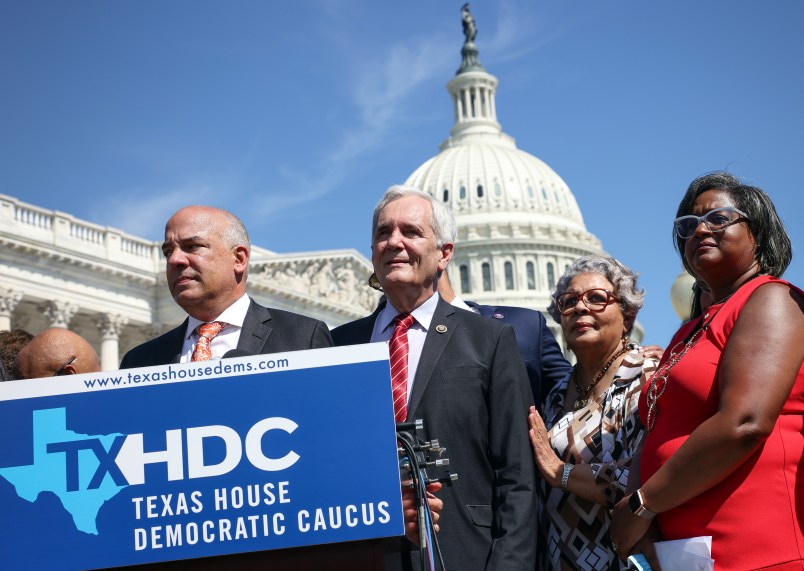Fresh off their flight, Texas Democrats held court outside the U.S. Capitol on Tuesday where they argued that their exodus was only as extreme as the GOP actions that forced it.
Over 50 Texas Democrats left Austin for D.C. on Monday, a dramatic walkout meant to deprive the state House of the two-thirds quorum needed to pass a restrictive voting law overhaul pushed by their GOP counterparts.
Texas Republicans have roundly denounced the Democrats, casting the gambit as an abdication of duty and refusal to play by the rules, and even threatened to use law enforcement to ensure their return. Democrats have maintained that they will wait out this special session, stretching nearly a month, using the time to apply pressure to Senate Democrats to pass federal voting safeguards.
“At the outset of this legislative session, the process was poisoned, and it was poisoned by a Governor who defunded the legislative branch,” state Rep. Rafael Anchia (D) said at the press conference, adding that the retaliatory move violated both the state and U.S. constitutions.
Back in May, Texas Governor Greg Abbott (R) said he’d veto the part of the state budget that funds the legislative branch after Texas Democrats staged their first walkout to kill an earlier iteration of the voting restrictions during the regular session.
“No pay for those who abandon their responsibilities,” Abbott tweeted at the time.
That, Democrats said, showed the lengths the GOP would go to to pass restrictive voting legislation.
“When you start the process in such a coercive way,” Anchia continued, “when you say ‘I am going to be the absolute ruler of the state of Texas and defund the legislative branch,’ you have poisoned the entire process.”
State Rep. Chris Turner, chair of the Texas House Democratic caucus, added at the Monday press conference that they won’t begin to negotiate with Republicans on the voting packages until Abbott stands down on his “unconstitutional veto.”
But the Texas Democrats also argued that even before Abbott defunded the legislature, Republicans had made clear that they had no interest in working with the Democratic minority as they pushed their voting overhaul through.
“We are happy to work on bipartisan proposals that expand the right to vote,” Anchia said. “But that is not what we saw even at the outset of this process when none of the amendments offered by my colleagues were considered in committee.”
It’s an argument that aligns neatly with the one they’ll spend the next twenty-plus days making, if they make good on their promise to stay out of the Lone Star State until the special session runs down.
By dismissing Republicans’ process arguments that their walkout is a radical breaking of the rules with data points about how the GOP was operating in bad faith from the beginning, Texas Democrats hope to sway the couple of Senate Democrats currently enamored with asymmetrical strictures. In their case, it’s the filibuster.
As Turner pointed out, Republicans had no problem blowing up the Senate rule in 2017, when it was keeping them from filling the Supreme Court with young conservative justices. It’s only become sacrosanct to them now, when it’s the lone barrier standing in the way of Democrats passing voting rights expansions and the rest of President Joe Biden’s agenda.
While the argument may be sound and hold water with most of the Senate Democratic caucus, it still all comes down to the opinions of two individuals: Sens. Kyrsten Sinema (D-AZ) and Joe Manchin (D-WV), the filibuster’s defenders.
When asked how this lobbying effort would differ from the one they attempted earlier in the summer, Turner pointed out that shortly after their visit, the whole caucus — including Manchin, a possible holdout — coalesced behind voting to advance the For the People Act to debate. While the bill was still filibustered by Republicans, it was seen as a critical vote to convey Democratic unity.
“We don’t expect anything up here to be easy,” Turner said, the echoes still dying down from his colleagues’ impromptu rendition of “we shall overcome.”



